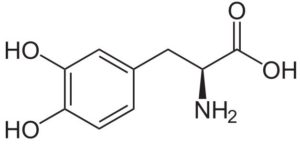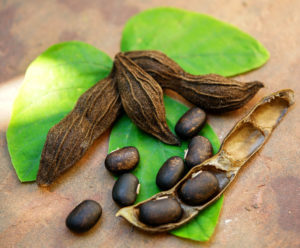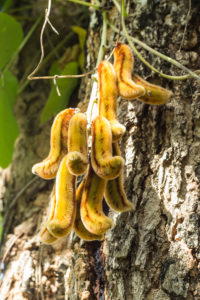Table of Contents
Key Takeaways
- L-DOPA is a vital amino acid precursor of neurotransmitters dopamine, epinephrine, and norepinephrine synthesized in the brain from l-tyrosine.
- Mucuna Pruriens is a natural source of L-DOPA, used as a nootropic to enhance brain function by increasing dopamine levels.
- L-DOPA from Mucuna Pruriens can improve memory, cognition, mood, and overall brain health while reducing stress and acting as an antidepressant.
- Opt for organic Mucuna Pruriens extract with higher L-DOPA concentrations (15% – 30%) to ensure better tolerance and efficacy, avoiding synthetic versions used for Parkinson’s treatment.
- Nootropic use of L-DOPA is generally safe and well-tolerated, but caution is necessary to avoid tolerance and dependence issues.
See my article on all of the supplements that have been shown to help with Parkinson’s here: Best Supplements for Parkinson’s Disease
L-DOPA (levodopa, L-3,4-dihydroxyphenylalanine) is an amino acid synthesized in your brain by the amino acid l-tyrosine. L-DOPA is a precursor of several neurotransmitters including dopamine, epinephrine, and norepinephrine.
Mucuna Pruriens contains naturally occurring L-DOPA in high concentrations. And is used as a nootropic because dopamine itself cannot cross the blood-brain barrier.
Dopamine and norepinephrine are essential for memory, cognition, and a positive mood. A lack of either of these neurotransmitters can lead to a lower mood state, loss of memory, brain fog, poor energy, and more. And if left unchecked will eventually result in neurodegenerative diseases like Parkinson’s.
L-DOPA helps:
- Brain Health. L-DOPA helps to increase growth hormone levels in the brain. Boosting the production of neurons and glia cells affecting the formation of memories, and overall brain health.
- Neurotransmitters. L-DOPA is a necessary precursor for your brain to make dopamine. And dopamine is then synthesized into the neurotransmitters epinephrine, and norepinephrine. Affecting cognition, learning, memory, movement, motivation and pleasure.
- Neuroprotection. L-DOPA produces neuromelanin which is similar to the melanin pigment in your skin. In your brain they absorb toxic quinones, and chelate heavy metals like mercury and lead.
Overview
L-DOPA (levodopa, L-3,4-dihydroxyphenylalanine) is an amino acid that’s naturally synthesized in your brain by the amino acid l-tyrosine.

L-DOPA is a necessary precursor to the synthesis of the neurotransmitter dopamine. Called a catecholamine, dopamine is then synthesized into the other catecholamines epinephrine (adrenaline) and norepinephrine (noradrenaline).
Unlike Dopamine, L-DOPA can cross the blood-brain barrier. This is why we supplement with L-DOPA rather than dopamine.

And for a dopamine boost, neurohackers use Mucuna Pruriens, which contains high levels of L-DOPA.[i] This legume, native to the tropical regions of India, Africa and the West Indies, and also known as velvet bean, has been used in Ayurveda medicine since 1500 B.C.
The ancients used Mucuna Pruriens to treat things like snakebite, intestinal problems, sexual issues, and a melancholy mood.
Raising levels of the neurotransmitter dopamine in your brain helps regulate mood and cognition.[ii]
Mucuna Pruriens vs. L-DOPA: What’s the Difference?
Mucuna Pruriens is an extract of the velvet bean plant that grows 3 – 18 meters in height. L-DOPA (levodopa) is usually synthetic and made in the lab.
The natural version of L-DOPA from Mucuna Pruriens is generally well-tolerated by most people. And the compounds in the plant are bio-identical to those chemicals naturally made in your body. Not so with synthetic L-DOPA.
Synthetic L-DOPA is metabolized into dopamine in your body by an enzyme called aromatic L-amino acid decarboxylase (AADC). And the majority of synthetic L-DOPA will be converted peripherally (not in the central nervous system and brain). This can cause problems.
So when used therapeutically, as in treating Parkinson’s Disease, L-DOPA is administered in combination with an inhibitor of peripheral AADC. Drugs like carbidopa (or other AADC inhibitors) ensure most of the L-DOPA is preserved for conversion to dopamine in the brain. And not the rest of your body.
This is critical for nootropic users to keep in mind. Chronic, or prolonged use of synthetic L-DOPA can lead to things like dyskinesia. This is a movement disorder where neurological discoordination results in uncontrollable, involuntary movements.[iii]
I am not telling you this to dissuade you from using L-DOPA. Stick with an extract of Mucuna Pruriens and you should be fine.
How does L-DOPA Work in the Brain?
L-DOPA boosts brain health and function in several ways. But two in particular stand out.
- L-DOPA improves memory. It’s metabolized into dopamine in your body by an enzyme called aromatic L-amino acid decarboxylase (AADC). This increases dopamine levels in your brain.
Researchers at the University of Münster in Germany conducted a study with 40 healthy people. In this randomized double-blind study, they gave one group 100 mg of levodopa daily for 5 days. The other group took a placebo.
90 minutes later on each day, subjects were given a memory test based on vocabulary. The study found that levodopa significantly enhanced the speed, overall success, and long-term retention of novel words.[iv]
- L-DOPA promotes brain health. Research suggests Mucuna Pruriens protects your brain by regulating cognitive and neural functions. And even encouraging neural activity.
Researchers in India showed that Mucuna Pruriens is a potent antioxidant. They performed assays to evaluate the enzymatic and nonenzymatic antioxidants in extracts. They found high levels of flavonoids, alkaloids, tannic acids, gallic acids, quercetin equivalents, and sitosterol equivalents.[v]
All of these compounds scavenge for free radical in your brain. Free radicals are formed during normal brain activity, like the synthesis of ATP that is produced in your mitochondria.
Your brain is equipped to eliminate some of these free radicals on its own. But especially in today’s environment in which we live, your brain is overwhelmed. Free radicals cause inflammation which damages and can kill brain cells. Affecting memory, learning, recall, cognition and mood.
Mucuna Pruriens has been proven to be a very effective brain inflammation fighter. It even has the ability to chelate heavy metals like mercury and lead in brain cells. And it’s antibacterial.[vi]
Mucuna Pruriens helps your brain make naturally occurring neuronal pigments called neuromelanin’s. They’re similar to the melanin found in your skin. And they’re often found in regions of your brain where dopamine is active.
The synthesis of neuromelanin’s in the various regions of your brain is an important protective process. The melanic component is generated through the removal of reactive/toxic quinones that would otherwise cause neurotoxicity.
This melanic component promoted by Mucuna Pruriens is what chelates and accumulates toxic, heavy metals like mercury and lead.[vii] Preventing them from damaging brain cells.
How things go bad
As we get older, our brain chemistry and energy metabolism changes.
↓ Dopaminergic neurons are damaged or die
↓ Dopamine levels decline
↑ Stress levels increase
↓ Long-term memory and mood decline
All of these age-related changes are contributing factors to the neurodegenerative diseases of aging, including Parkinson’s Disease.
L-DOPA benefits for brain health
Mucuna Pruriens natural herbal supplement extract contains high levels of L-DOPA, the precursor to the crucial neurotransmitter dopamine. Dopamine is further synthesized into the neurotransmitters epinephrine (adrenaline) and norepinephrine (noradrenaline).
Dopamine plays a critical role in learning and absorbing new information. Increasing brain levels of dopamine helps regulate mood and boosts cognition.
Research also suggests that Mucuna Pruriens provides antioxidants that defend against oxidative damage caused by free radicals.[viii]
How does L-DOPA feel?
Neurohackers report that using Mucuna Pruriens helps in multi-tasking, improving motivation, more focus, less stress, and a sense of calm.
You could find your energy levels increase, less brain fog, and a boost in overall mood. A more positive outlook on life. And an increase in libido.
L-DOPA Clinical Research
Mucuna Pruriens (L-DOPA) as an
alternative for Parkinson’s Disease
Researchers at the Parkinson’s Institute located at the University of Milan in Italy recruited 18 patients with advanced Parkinson’s Disease. The patients were given either ground Mucuna Pruriens powder (standardized 5.7% L-DOPA) or prescription form of levodopa containing a dopa-decarboxylase inhibitor. And then measured motor improvements at 60 and 90 minutes after using the supplement or drug.
The researchers found Mucuna Pruriens standardized powder produced reduced Parkinson’s symptoms equivalent to the prescription version of levodopa. But with significantly fewer problems with dyskinesias. The team concluded the “Clinical effects of high-dose Mucuna Pruriens were similar to levodopa alone at the same dose, with a more favorable tolerability profile“.
Mucuna Pruriens reduces stress
A study was conducted to assess the role of Mucuna Pruriens in infertile men. It was done at King George’s Medical University in Lucknow, India. The study included 60 men who were undergoing infertility screening. And no surprise here; were found to be suffering from stress.
The control group in this study were 60 age-matched men who had initiated at least one pregnancy. The infertile men were given 5 grams of Mucuna Pruriens seed powder per day for 3 months. Semen samples were collected at the beginning of the study. And after 3 months of treatment.
The researchers found that treatment with Mucuna Pruriens significantly decreased stress levels. And increased sperm count to the same level as the fertile control group of men.
They “concluded that M. pruriens not only reactivates the anti-oxidant defense system of infertile men but it also helps in the management of stress and improves semen quality.”[ix]
L-DOPA improves learning
This study in Germany was done with 40 healthy subjects. They were given 100 mg of L-DOPA or a placebo for 5 days in a randomized, double-blind trial.
Subjects were trained on artificial vocabulary using a high-frequency, repetitive approach. This was done 90 minutes after L-DOPA administration on each day of the trial.
The researchers found that L-DOPA significantly enhanced the speed, overall success, and long-term retention of the words.[x]
L-DOPA as an anti-depressant
Increasing dopamine in your brain also boosts your mood and libido. This study was done in India with mice. Researchers used the well-known Forced Swimming Test (FST), Tail Suspension Test (TST), and Chronic Unpredictable Mild Stress (CUMS) test.
The mice were fed Mucuna Pruriens seed extract, and then evaluated while performing, well… what mice do in the lab. The research team found that Mucuna Pruriens seed extract has significant antidepressant qualities. Which would simply verify what we already know in humans.[xi]
Using Mucuna Pruriens extract is a great anti-depressant.
L-DOPA Recommended Dosage
L-DOPA (Mucuna Pruriens extract) suggested dosage for cognitive benefits is 250 – 500 mg twice per day. Most Mucuna Pruriens extracts only contain 15 – 20% L-DOPA. So you may need to adjust your dose up or down depending on how you respond to this supplement.
You may also find that you need to cycle the use of L-DOPA (Mucuna Pruriens). And use it only 4 or 5 days a week. This can help avoid tolerances and dependencies (which are common with any dopamine agonist). DO NOT attempt to cycle this nootropic if you are using it to treat Parkinson’s Disease.
If you are using Mucuna Pruriens extract (L-DOPA) for Parkinson’s Disease you will likely need 500 – 1,000 mg Mucuna Pruriens 3 or more times per day. And look for a Mucuna Pruriens extract (98% L-DOPA).
See my article on all of the supplements that have been shown to help with Parkinson’s here: Best Supplements for Parkinson’s Disease
L-DOPA Side Effects
L-DOPA is produced naturally in your body. So is considered well-tolerated and safe. And L-DOPA from Mucuna Pruriens extract is particularly well tolerated by most people.
Research shows that the natural form of L-DOPA from Mucuna Pruriens compared to synthetic versions of L-DOPA provides similar results. But without the common side effects of nausea, vomiting, and involuntary muscle movement.[xii]
But be very careful when working with dopamine. Too much and you can experience symptoms like hair loss, auditory or visual hallucinations, psychosis, Dyskinesia and more.
Of course, if you begin to experience any of these side effects, stop supplementing with L-DOPA (Mucuna Pruriens) immediately.
Like any natural supplement, it’s always better to use an organic source.

Type of Mucuna Pruriens (L-DOPA) to buy
Mucuna Pruriens is typically available in powder, capsule or tablet form. Some are pure, dried Mucuna Pruriens powder.
Several manufacturers offer Mucuna Pruriens extracts ranging from 15% – 30% L-DOPA. Or they tell you how many mg of L-DOPA is in each capsule or tablet.
A few manufacturers call it “Velvet Bean Extract” or “Mucuna Extract” with the percentage of L-DOPA in each capsule or tablet. It’s the same as Mucuna Pruriens.
Try to find “organic” or “certified organic” if you can. And for Nootropic use, avoid synthetic L-DOPA which is typically used to treat Parkinson’s Disease.
Nootropics Expert Recommendation
L-DOPA (Mucuna Pruriens) dosage 250 – 500 mg twice per day
 I recommend using L-DOPA as a nootropic supplement.
I recommend using L-DOPA as a nootropic supplement.
Your body does synthesize some L-DOPA on its own. And converts it into the essential neurotransmitters dopamine, epinephrine, and norepinephrine.
But as you get older, dopamine receptors die or become unresponsive. Or your body doesn’t convert the necessary amino acids well enough to supply the neurotransmitters you need for an optimized brain.
L-DOPA is helpful to boost energy and motivation levels, memory, clear brain fog, improve mood and libido.
L-DOPA is especially helpful for those suffering from neurodegenerative diseases like Parkinson’s. And the natural form of L-DOPA from Mucuna Pruriens often offers better results with fewer side effects than prescription drugs.
I suggest starting with a dose of 100 – 250 mg twice daily for nootropic use at first. And you may find that you need to cycle L-DOPA. Use it for 4 or 5 days and take a break. Tolerance is often a problem when working with dopamine. As is dependence or addiction.
If you are using Mucuna Pruriens (L-DOPA) for Parkinson’s Disease, please see my article on all of the supplements that have been shown to help with Parkinson’s here: Best Supplements for Parkinson’s Disease









Join The Discussion - 403 comments
Rooney
May 4, 2024
Hi David,
the brand Nutricost contains 40% L Dopa, could you suggest another brand of 15-20 % L Dopa?
What do you think for example of Paradise Herbs Mucuna or Himalaya Organic Mucuna
Thank you.
David Tomen
May 7, 2024
Rooney, it depends on what you are trying to treat with this supplement. Paradise Herbs is only 15% L-DOPA and Himalaya does not even tell us the percentage of L-DOPA in their supplement. Neither would be acceptable if you were using it for Parkinson’s.
Roberto
April 24, 2024
Can Testlabpro (l dopa contain) be mixed with Adderall and Bupropion?
David Tomen
April 24, 2024
Roberto, it should support the use of Adderall. But may potentiate the effects of Bupropion.
Brad
April 14, 2024
Studies have shown that levodopa toxicity can damage neuronal cells. The formation of free radicals once the body oxidizes levodopa can induce apoptosis. Also, dopamine, norepinephrine, and epinephrine levels can rise in the blood when levodopa undergoes decarboxylation in the periphery.
https://www.ncbi.nlm.nih.gov/books/NBK482140/#:~:text=Studies%20have%20shown%20that%20levodopa,undergoes%20decarboxylation%20in%20the%20periphery
David Tomen
April 22, 2024
Brad you are correct that levodopa can be toxic. That is not what I’m talking about in the above review. This review is for natural L-DOPA extracted from Mucuna Pruriens. It’s not synthesized in the lab.
Kim
May 27, 2024
Are there any substances/alkaloids/flavonoids in mucuna that allow L-dopa to reach the brain and not be decarboxylated in the periphery? Pure L-dopa only 5-10% enters the brain, the rest goes to the periphery. Is there any evidence that plant mucuna 15% or pure natural 99-100% L-dopa isolate is better than the synthetic version in relation to what was stated above?
David Tomen
June 3, 2024
Kim, the evidence that you don’t experience the periphery side effects by using natural L-DOPA vs. levodopa is in the user reviews. I’m sure there is a mechanism for that but I’ve not come across any neuroscience explaining why this works. I just know that it does from personal experience as well as the experience of thousands of users.
Dean
March 7, 2024
Hi David, where you say “L-DOPA (Mucuna Pruriens extract) suggested dosage for cognitive benefits is 250 – 500 mg twice per day.” Is that 250 – 500 mg of “whatever’s in the capsule”? Or is that 250 – 500 mg of “actual L-dopa”?
I think it would be good to clarify above, since the weight of “whatever’s in the capsule” is very different from the weight of the “actual L-dopa” in the capsule.
Thanks!
David Tomen
March 9, 2024
Dean, that dosage is “suggested” and it does mean whatever is in the capsule. So it depends on the strength of the extract. You may need to use more to feel its benefit.
Shannon Haggard
February 18, 2024
I am taking carbidopa-levodopa for parkinsons. Is it ok and or helpful to supplement with muncun? If so any recommendation on doseage?
David Tomen
February 19, 2024
Shannon, Mucuna Pruriens extract provides natural L-DOPA which works exactly like the carbidopa-levodopa you are currently using. But the natural form does not produce the same side effects like the prescription form.
I have many coming to Nootropics Expert with Parkinson’s and switching from carbidopa-levodopa to Mucuna Pruriens (95% L-DOPA). You cannot use most Mucuna Pruriens supplements on the market unless it is 95 – 99% L-DOPA. Most are 15 – 20% L-DOPA and do not provide the symptom relief compared to the 99% extract.
See my article on Parkinson’s Disease here: https://nootropicsexpert.com/best-supplements-for-parkinsons-disease/. And here is a link to 99% L-DOPA: https://geni.us/qUrUFuu (Amazon)
Ghizal Miri
February 13, 2024
Hi, I do not see any Amazon links for where to purchase Mucuna pruriens from. could you recommend one please?
David Tomen
February 14, 2024
Ghizal, my recommendation depends on if you do or do not have Parkinson’s. If it is Parkinson’s then I recommend this one: https://geni.us/qUrUFuu Cur EASE® L-DOPA 99% (Amazon)
Ghizal Miri
February 15, 2024
Hi David, I do not have Parkinson’s. I want to use it for focus and productivity.
David Tomen
February 15, 2024
Then you do not not need that powerful of an extract. This is what I recommend if you do not have Parkinson’s: https://geni.us/p8c67 (Amazon).
But I think you’d have more success just using plain L-Tyrosine 500 mg twice per day. See my Tyrosine review for a fuller explanation.
daniel
January 25, 2024
Hey im taking mucuna pruriens powder 1.5 gram 3 days a week. Would u say 1.5 grams of 4.88%(L-DOPA) mucuna pruriens powder is the same as 500mg of 15%(L-DOPA) mucuna pruriens extract?
David Tomen
January 26, 2024
Daniel I suck at math but that sounds about right. But L-DOPA has a short half life so the days you are not taking it means you are not getting the benefit of additional dopamine.
Jim
February 14, 2024
Hi David,
Is it safe to combine natural L Dopa with Ritalin to make the Ritalin work better?
David Tomen
February 15, 2024
Jim, it’s safe but I highly recommend L-Tyrosine to increase dopamine rather than L-DOPA. Especially for use with Ritalin.
Pat
January 18, 2024
Hi, David:
First, thank you very much for all of the work putting this together. I have a couple of questions if you don’t mind helping me out. This might not be your area of expertise, but any help is greatly appreciated.
1.) I am taking this primarily for the purpose of lowering my prolactin. My most recent score was 35.8 ng/ml. Do you have any experience (or anecdotes) you could share of this successfully lowering prolactin? In theory, it seems this should work as it’s a dopaminergic.
2.) I purchased the Nutricost Mucuna Pruriens seed extract (40% min L-DOPA). The recommended dose is 800 mg (2 caps). I saw you had a dosage for 20% L-DOPA – do you have any recommendations on 40%?
3.) Is it okay to take this for 4-5 days in a row and then cycle it monthly and repeat? If not, what is the appropriate amount of days?
4.) My last question – is it okay to take this with 500 mg – 1 gram of L tyrosine? Or should I not take L tyrosine when I take mucana.
Thank you very much in advance for taking the time. Cheers!
David Tomen
January 18, 2024
Pat:
1) theoretically it will lower prolactin. But the only way to know for sure is to try it.
2) Use half my recommended dose with a 40% extract.
3) You will not get the benefit of increased dopamine for the 2 days you do not use L-DOPA.
4) Increasing dopamine in excess and not keeping it in balance with serotonin can get you intro trouble.
Pat
January 20, 2024
Thanks for the info. Also, I forgot to ask – do you think it’s safe to take modafianil at the same time as mucuna? Thanks!
David Tomen
January 22, 2024
Pat, the L-DOPA provided by Mucuna Pruriens will help potentiate the way Modafinil works because the drug is a dopamine reuptake inhibitor.
Dida
May 8, 2024
Hi David,
I have microadenoma 5mm and high levels of prolactin 700 mIU/L. What is the recommended dosage of L-Dopa, how long should be taken and what else can you please recommend to take to lower prolactin.
Thank you.
David Tomen
May 9, 2024
500 mg twice per day, Vitamin B6 (P-5-P) 100 mg per day, and zinc 30 mg per day.
Dida
May 11, 2024
Thanks from ❤️David .. Please tell me which L Dopa to take .. Thank you♥️
David Tomen
May 12, 2024
Dida, it depends on if you are dealing with Parkinson’s or not.
Dida
May 14, 2024
Hi David! I don’t have Parkinson’s, I have a 5 mm pituitary adenoma. Please tell me which L Dopa I should order and how long I should drink it.Thanku so much ♥️
David Tomen
June 11, 2024
Dida, I’m not a doctor so cannot “prescribe” dopamine therapy. This is something you need to consult with a doctor who understands the use of natural supplements to treat disease.